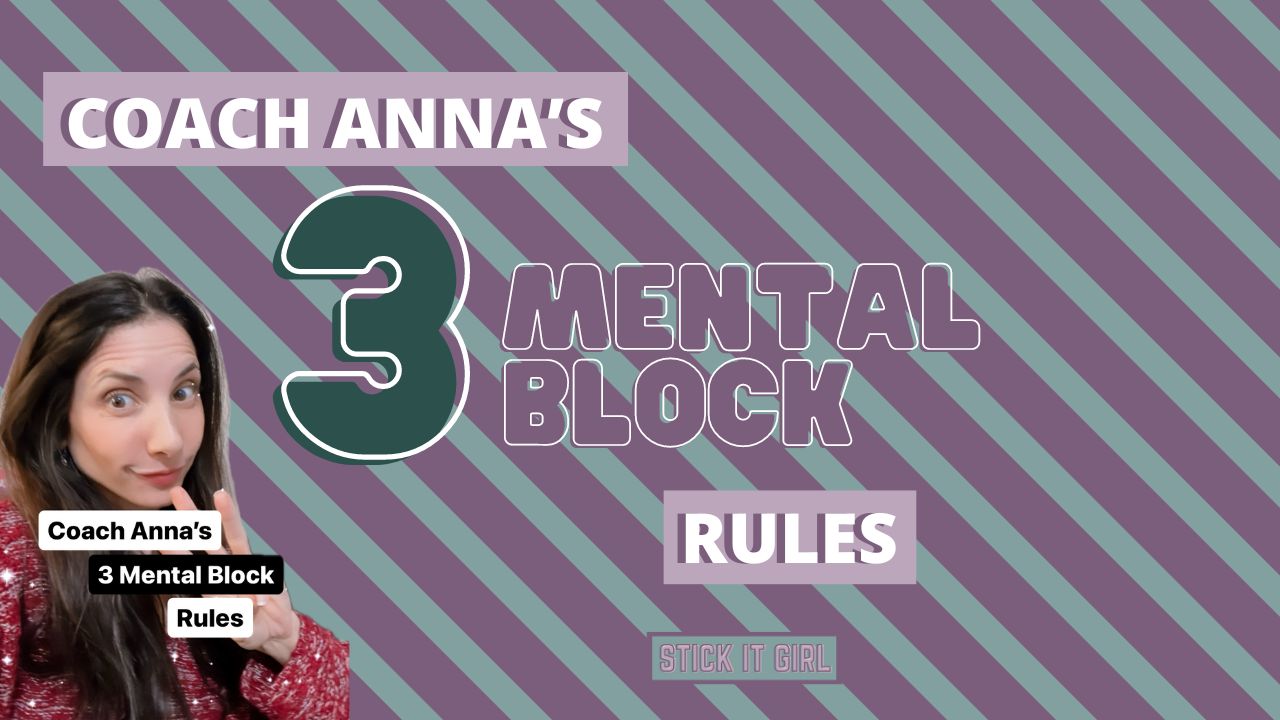
After working with countless competitive gymnasts who have mental blocks, I've noticed some things that gymnasts do that make their mental blocks worse.
As a result I've come up with some mental block rules to help gymnasts move through their mental blocks.
Here are Coach Anna's 3 Mental Block Rules for Gymnasts:
Rule 1: Never ever push through a mental block.
Most gymnasts think that when they get blocked on their skills, they need to push through and keep trying their skills again and again and again.
While I'm not suggesting gymnasts give up on their skills, I am recommending that gymnasts listen to what their brains are telling them.
If you go for a skill and you balk or bail out of it, that's a signal from your brain that it's stopping you from doing your skill. The more you keep trying and balking, the more you are reinforcing the pattern of not going and the more quickly you are eroding trust with your brain.
Instead, if your brain is stopping you from going for your skill, listen to it. Ask your brain what it CAN do instead.
When I had mental blocks as a gymnast I would know immediately if I wasn't going to go for a certain skill or progression. I had this feeling in my belly that told me "not today." And no matter how hard I tried or how long I stood on beam, I just wouldn't go for my skills.
So listen to your brain. If you balk or bail out on your skill, give it one more try. If it happens again then that's a sign to move onto something else (or a different progression of your skill).
If you continue to push, your brain will push back even harder to make sure you're listening. So don't test your brain. It always wins.
Rule 2: You are the expert on your brain.
One thing gymnasts do that is detrimental towards their progress of moving through a mental block is that they try to do what their coaches are telling them to do.
Now normally your coach is someone you need to listen to in order to learn new skills, stay safe, and score big. But when it comes to mental blocks, it's a completely different story.
Only YOU are inside of your brain. Only YOU know what your brain is feeling as a safe option and what it is resisting.
No one can tell you what you need to do. That is up to you. And it is important that you advocate or speak up for yourself.
If a progression doesn't feel right to you, then don't go for it.
If your coach is forcing you to stand on beam until you throw your series but you know your brain is telling you not to go for it, you need to speak up.
The only way to get through a mental block successfully is to listen to what your brain is telling you and to honor those requests.
If you are constantly doing what other people tell you to do without listening to your own brain, you will stay stuck in your mental block for much longer than you have to.
You are the expert. You get to decide what you need and can do in any given moment.
Rule #3: Your skill isn't lost. It's frozen. Focus on thawing it out.
What do I mean by this?
Well most gymnasts assume that when they can't do their blocked skill, it means they've "lost" it.
The truth is, your skill hasn't gone anywhere. It's still in your body.
It's your mind that is stopping you from doing it.
Think of your skill as being frozen in a big cube of ice.
The longer the mental block has been going on, the thicker the cube.
In order to thaw your skill out and be able to do it again you need to build up trust with your brain. That's the secret to thawing out your frozen skill.
Building up trust means giving your brain what it needs. It means focusing on what you CAN do. It means asking for a spot when you need one. It means standing up for yourself if you're being forced to do something you know you won't do in that moment.
It also means being kind to yourself and not getting impatient or frustrated and yelling at your brain.
Trust takes time. And it might be high one day and low the next. That's the journey through a mental block.
Stay the course. Keep listening to your brain and do what you CAN do.
Hopefully those three tips are helpful to you.
Going through a mental block is frustrating and confusing. It can feel lonely and exhausting.
But once you start putting the right tools into place, you'll move through your mental block and be back to doing your skills again.
-----
If you or your gymnast needs support, in addition to the resources below I also offer one-on-one coaching sessions via Zoom.
Helpful Links:
- Resources: Get gymnastics downloads to help your gymnast work on her mental skills in gymnastics
- Mental Health Training for Gymnasts: Help your gymnast learn about her brain and the fight-flight-or-freeze response.
- Free Facebook Group for Moms of Gymnasts: Join this group to chat with other gymnastics moms and get tips for how to help your gymnast navigate through the mental ups and downs of gymnastics



